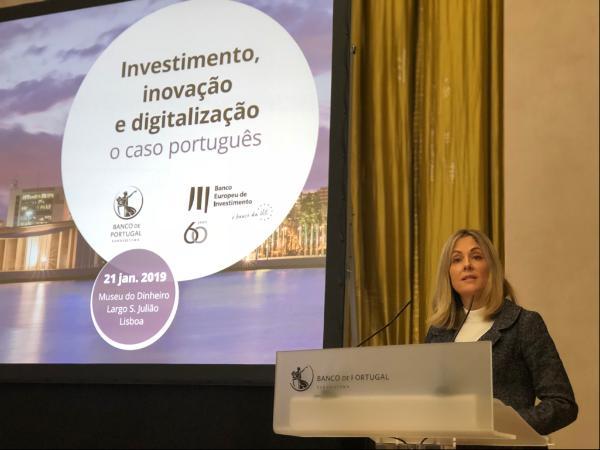
- The European Investment Bank (EIB) and Banco de Portugal today hosted a conference entitled “Investment, Innovation and Digitalisation: the Portuguese case”.
- At the event, the EIB presented the results of its latest annual EIB Investment Report and Survey (EIBIS) for Europe and Portugal, which provide a better understanding of investment dynamics and investment needs in Portugal.
- The EIBIS survey for Portugal confirms the ongoing pick-up in investment in the country while pointing out the need to continue fostering it.
As part of a series of events organised to debate current trends in investment in different EU Member States, the European Investment Bank (EIB) and Banco de Portugal hosted a conference entitled “Investment, Innovation and Digitalisation: the Portuguese case” in Lisbon today. The Governor of Banco de Portugal, Carlos Costa, and EIB Vice-President Emma Navarro opened the conference, which involved the participation of Pedro Siza Vieira, Deputy Minister and Minister of Economy. Policymakers and representatives from financial institutions and the business community also attended the event.
During her opening remarks, EIB Vice-President Emma Navarro said: “The EIB is a long–standing partner of Portugal, having supported the country’s economy for more than 40 years. The EU bank has provided around EUR 50 billion to finance close to 500 operations that have contributed to boost the competitiveness of Portuguese SMEs and to support projects mainly in the transport, energy and industry sectors, facilitating the modernization and transformation of the country. The EIB reiterates its commitment to continue playing a critical role in the financing of the structural investments needed to overcome the challenges we are facing and to support Portugal in this endeavor”
At the event, the EIB also presented the results of its latest annual EIB Investment Report and Survey (EIBIS) for Europe and Portugal, which provide a better understanding of investment dynamics and investment needs in Portugal.
The report, based on a survey of 12,500 European firms, finds that a backlog of investment continues to weigh on Europe’s economic recovery: climate change mitigation investments remain depressed, while EU firms are still not putting enough resources into research and development, other intangibles, and even machinery and equipment, to stay globally competitive. The share of investment and other growth-enhancing expenditure in total government expenditures remains low, in particular in the periphery countries. However, overall investment, especially in the corporate sector and in buildings, is picking up and reaching historical averages in most EU countries.
Investment situation in Portugal
With regard to Portugal, the survey, based on 535 non-financial corporations, broadly confirms the ongoing pick-up in investment in Portugal. Access to finance has improved compared to other perceived investment bottlenecks, and is no longer the largest perceived impediment to investment: 5% of firms are finance-constrained, down from 12% in the previous survey, and now in line with the EU average.
Moreover, the survey finds that investment continued to recover, going up by 10% compared to the previous year, but remains around 20% below its 2008 level. Despite the growth in corporate investment, the gap vis-à-vis pre-crisis levels is primarily driven by the government and household sectors. Investments in dwellings and infrastructure continue to be a drag on aggregate investment activities, whereas investment in machinery and equipment nearly reached the pre-crisis level.
Around eight out of ten Portuguese firms consider uncertainty about the future to be the main obstacle to their investment activities, followed by energy costs and business and labour market regulations (84%, 81%, 79% and 77% respectively). All are more likely to be seen as barriers in Portugal than EU-wide, where the equivalent figures are 69%, 58%, 64% and 62%. Lack of availability of skilled staff is a barrier for 77% of firms in both Portugal and the EU. Limited availability of finance is also more likely to be regarded as a barrier in Portugal than in the EU as a whole.
Looking forward, there is still a need to foster investment, especially intangible, as Portugal stands at the lower end of the EU distribution in terms of intangible investment. More intangible investment is required at a time when the economy is becoming increasingly knowledge-based. Some changes in the nature of the Portuguese financial system may be helpful in this regard.

Photographer: Mercedes Landete ©EIB
Download original